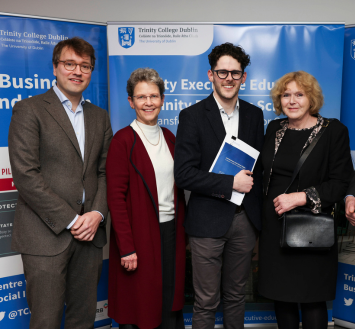
As Trinity Business School seeks to "Transform Business for Good", we recognize that students should be prepared to tackle the urgent social and environmental issues that are transforming society. Dr. Maximilian Schormair, Assistant Professor in Business Ethics at Trinity Business School, is the director of the school's new MSc in Responsible Business & Sustainability programme. Here, he discusses the programme structure as well as the career prospects after completing the programme.
Can you tell us a little about your background – what are your research areas of interest, what have you been involved with in the school?
My name is Maximilian Schormair, I am an Assistant Professor in Business Ethics and I lead several Executive Education programmes in the sustainability area at Trinity Business School. I am very excited to be the director of this flagship MSc programme for the school’s “Transforming Business for Good” strategy.
My research focuses on stakeholder engagement in relation to advancing social and environmental issues in global supply chains. For example, I have studied how multi-stakeholder initiatives can improve working conditions in the Bangladeshi textile industry or how multinational corporations can collaborate with civil society organisations to improve chemical management practices in textile factories in Asia.
Moreover, I have studied how companies can engage in non-judicial remediation of adverse human rights impacts in supply chains. Furthermore, I am currently studying very ambitious sustainability-oriented business models aiming for regeneration and net-positive societal impacts. I am very passionate about responsible and sustainable business conduct being involved in several initiatives at the school, such as the Business Ethics Speaker Series, or the Business and Human Rights Benchmarking Initiative led by the Trinity Centre for Social Innovation.
 Dr Maximilian Schormair with Dr Mary-Lee Rhodes, Dr Ben Hogan and Prof. Mary Lawlor
Dr Maximilian Schormair with Dr Mary-Lee Rhodes, Dr Ben Hogan and Prof. Mary Lawlor
The programme has a clear focus on understanding how businesses can become responsible and sustainable actors in tackling common societal challenges, such as climate change, human rights, diversity, equity and inclusion, or the disruptive impact of digital technologies. The curriculum is designed to convey the essential skills and expertise regarding responsible business and sustainability enabling students to make a positive impact on society through their future roles in business.
Since sustainability in business is a global challenge requiring global collaboration, the programme brings together a diverse group of students from all over the world with different academic backgrounds and experiences. Students will get to know each other well early on through social kick-off activities in the first weeks of the programme. Another core part of the student experience will be deep and direct engagement with business practice in the form of field trips, company visits and guest lectures from leading sustainability practitioners. Furthermore, the programme offers each student to pursue either an individual research dissertation or a group student consultancy project with external partners (businesses, civil society or public sector organisations).
What type of student should consider applying for the MSc in Responsible Business & Sustainability?We are seeking students from diverse academic backgrounds, such as business, management, engineering, natural sciences, political science, or humanities who have a strong interest in becoming a constructive part in the sustainability transformation. Designed for non-business and business graduates, we value applicants who can demonstrate a clear motivation for their interest in business or have practical experience in the field.
What careers can students expect when they complete the programme?In designing this programme, we made every effort to align cutting-edge academic insights with practical relevance to give students the necessary skills and expertise for an impactful career. Responsible and sustainable business has become a vibrant theme on the job market over the past years offering exciting opportunities for students in several ways: First, there is strong demand in specialist roles, such as sustainability/CSR/ESG managers or specific roles in relation to climate action, DEI, human rights due diligence, ESG reporting and accounting.
Closely associated with these roles is the career path of consulting, as both the established global management consultancies as well as smaller specialist consultancies are growing strongly in this area by supporting companies with the sustainability transformation. Second, sustainability is increasingly permeating more general management functions, such as marketing, accounting, procurement, or strategy allowing for sustainability-focused career paths beyond the specialist roles as well. Finally, there are a broad variety of civil society organisations as well as public sector organisations with a focus on assisting businesses with the sustainability transition providing exciting career opportunities for graduates of this programme.

